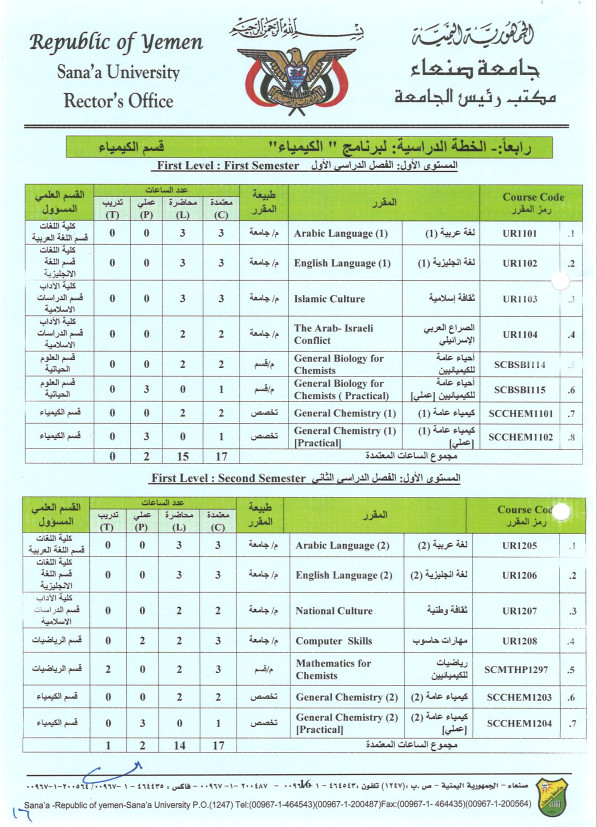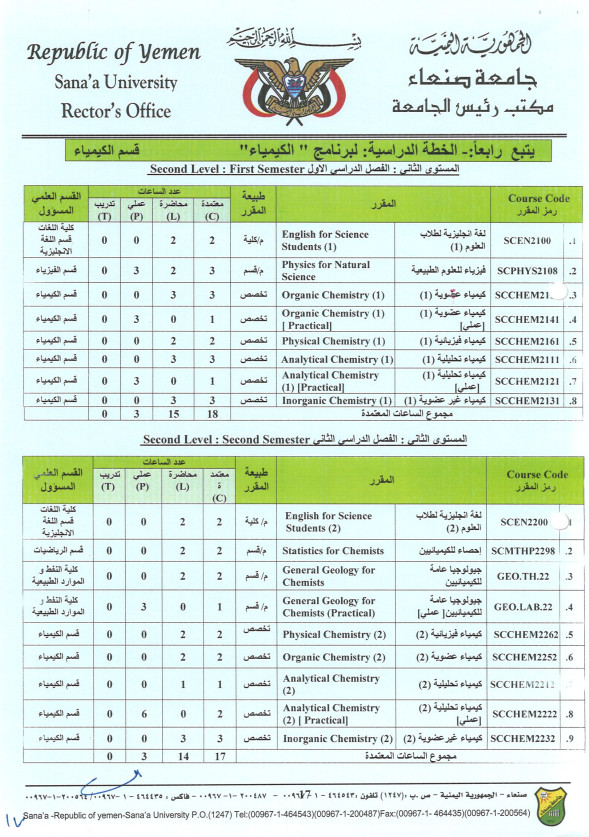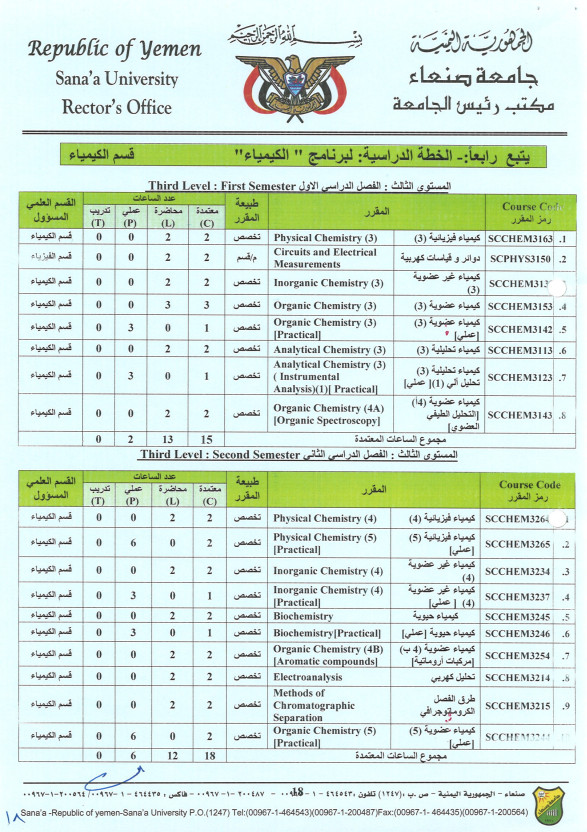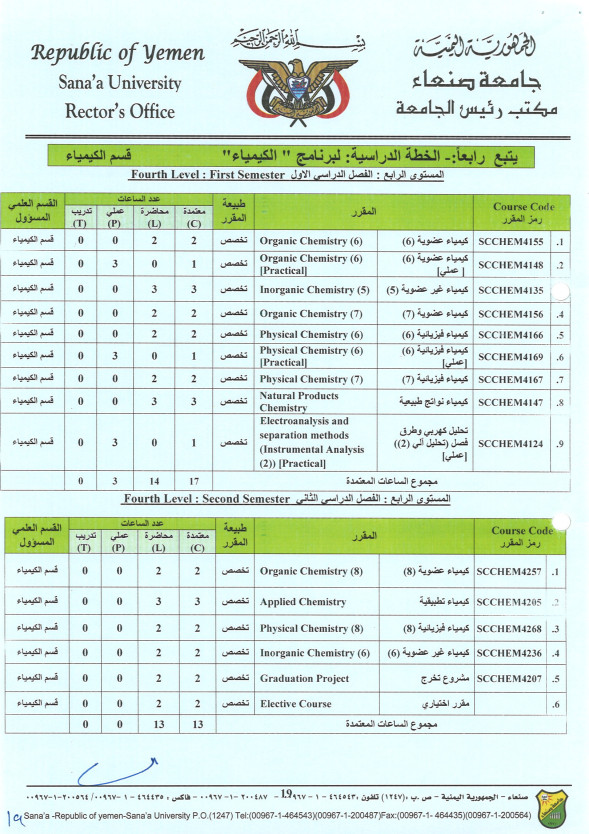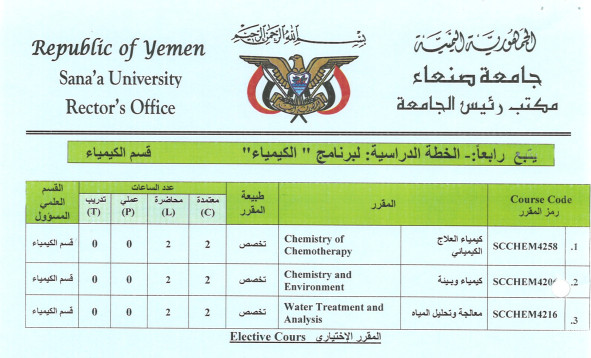Chemistry
Faculty of Science

Dep. VissionDep. MissionDep. AimsProgram's MissionProgram's AimsGraduate specificationsProgram learning outcomes
Leadership in education, learning and scientific research in the field of chemistry and its applications, and enhancing community partnership.
Qualifying the student scientifically and practically in the various fields of chemistry in accordance with quality standards that meet the needs of local and regional labor markets
• Graduating specialized scientific competencies in the various fields of chemistry necessary to serve society and sustainable development.
• Contributing to spreading scientific culture and instilling the principle of ethical and professional responsibility.
• Embracing distinguished students and providing the department with distinguished cadres in the required specializations that keep pace with scientific developments.
• Supporting faculty members to produce innovative scientific and applied research.
• Teaching chemistry courses to students of the department and other departments in the College of Science and some university colleges as needed.
• Develop, maintain and modernize laboratories and central research laboratories to enhance practical educational skills, scientific research and community service.
• Providing scientific consultations to relevant institutions to activate the partnership between the university and society.
• Developing and updating educational programs in accordance with comprehensive quality standards and striving to obtain academic accreditation.
Preparing graduates specialized in the field of chemistry, its applications and related fields to meet the needs of the labor market locally and regionally through a comprehensive educational environment that keeps pace with modern developments.
1- Providing students with cognitive and mental skills in the basic and specialized theoretical and practical principles in the field of chemistry, its branches, and related applied fields.
2- Providing students with the skills and abilities that help them use modern technologies in the fields of chemistry, and providing them with the skills of linking knowledge and application.
3- Developing students’ practical skills in analysis and measurement to deal with the results of analyzes of chemical compounds of different origin (laboratory-manufactured and naturally extracted)
4- The education process ensures values, ethics, communication skills, creative thinking, and comprehensive awareness of the field of chemistry and its applications and development, in order to enable students to be able to compete locally and regionally.
5- Instilling professional ethics, the importance of time, protecting the environment, caring for and developing oneself, and working in a team spirit to become a behavior that distinguishes the graduate’s personality.
The graduate program of the Bachelor of Chemistry meets specific specifications such that the graduate is able to:
1 Acquiring a broad field of knowledge in chemistry related to the basics in the main chemistry fields such as analytical, organic, inorganic, physical, and biological chemistry.
2 Use laboratory tools, modern devices, and chemical methods in order to conduct scientific experiments.
3 Collect, analyze and interpret all practical results and reach a useful scientific conclusion.
4 Using the computer and its programs to analyze information and process it with modern programs.
5 Acquiring practical skills in scientific research.
6 Using the modern library as a tool for researching all scientific references related to chemistry.
7 Communicating scientific ideas and results derived from theoretical and laboratory work through multiple communication skills in writing and oral skills.
1. Knowledge and understanding skills: After successful completion of the program, the graduate will be able to:
A1. It explains the nature of chemistry, its principles, theories, basic and specialized laws, its main branches, its relationship with the rest of the basic sciences, and its contributions to explaining many natural phenomena and the materials and energies in the universe.
A2. Spectra explains the methods of analyzing and proving chemical composition, methods of preparing chemical compounds, the rules of naming them, their behavior in their interactions, the changes accompanying their interactions, the mechanics and kinetics of the reaction of organic and inorganic compounds, and differentiates between different chemical compounds.
A3. Describes quantum mechanics, the periodic properties of elements, their atomic structures, and their location in the periodic table.
A4. Classifies various chemical reactions and describes them quantitatively and qualitatively in a correct scientific manner.
A5. It mentions methods of extraction, separation, and purification of chemical compounds from their various sources.
2. Mental skills: After successful completion of the program, the graduate will be able to:
B1. It defines the nature of matter, its states, properties, methods of classifying and analyzing it quantitatively and qualitatively, its behavior, the source of its activity, and the mutual relationship between matter and the electromagnetic spectrum, and using this to explain the behavior of matter and its chemical composition.
B2. Explains the speed and products of chemical reactions and the results of their chemical analyzes quantitatively and descriptively in a scientific manner characterized by accuracy and accuracy.
B3. Accurately analyzes the quantities and types of products of a chemical reaction based on chemical calculations and uses them to describe the reaction and the changes accompanying it.
B4 links the properties of periodic elements, their atomic structures, their location in the periodic table, and the nature of their interactions.
B5. Explains the property of stereoscopic and structural symmetry in the structure of some chemical compounds and its effect on their properties.
3. Professional and practical skills: After successful completion of the program, the graduate will be able to:
C1 Employs and scientifically applies basic principles and theories, ideas, laws, facts, and chemical concepts in security and safety, calibration of tools and devices, analysis and measurement, and designing laboratory experiments in various fields of chemistry and applied fields related to chemistry.
.C2 Uses the characteristic spectra and reactions of some functional groups and the analytical and measurement skills acquired in diagnosing and identifying chemical elements and compounds.
C3 practically carries out experiments that demonstrate some of the physical and chemical properties of matter, the kinetics of its interactions, and the energy changes (thermal electricity) accompanying them.
C4: Conduct practical experiments on some properties of elements and their compounds.
C5 Apply practical experience in an industrial process.
4. General and transitional skills: After successful completion of the program, the graduate will be able to:
D1. He demonstrates professional ethics in behavior and is proficient in communication and communication skills through appropriate scientific platforms to convey his scientific ideas and information to others in a safe manner that preserves intellectual property rights.
D2 bears responsibility for his professional and ethical commitment and environmental protection.
D3 communicates effectively with his colleagues and superiors at work and deals with them in a manner based on mutual respect.
D4 uses information technology and computer programs related to his field and in drafting scientific reports with familiarity with the language of research and modern science.
.D5 works in multicultural environments within a specialized group with a team spirit.
